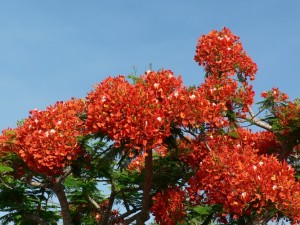Loving-Kindness (Metta)
May all beings have happiness
and the causes of happiness
 In this first verse, we generate the mind of Love (Loving-kindness). From the very depths of our heart, we radiate in all directions the sincere wish for all living beings to have happiness and the causes that bring happiness. The immeasurable quality of Loving-kindness is boundless, open, and pure—an all-embracing love, dedicated to serving the highest welfare of all beings. Like a nurturing mother who protects and cares for her children, this sublime Love brings comfort, tenderness, warmth, and understanding to those in need.
In this first verse, we generate the mind of Love (Loving-kindness). From the very depths of our heart, we radiate in all directions the sincere wish for all living beings to have happiness and the causes that bring happiness. The immeasurable quality of Loving-kindness is boundless, open, and pure—an all-embracing love, dedicated to serving the highest welfare of all beings. Like a nurturing mother who protects and cares for her children, this sublime Love brings comfort, tenderness, warmth, and understanding to those in need.
Always unconditional, free of self-interest, attachment, or expectation, Loving-kindness seeks no reward or compensation. This Love is the very heart of generosity, sympathy, and benevolence. In this way, Loving-kindness opens the heart and dissolves resentment, anger, hatred, possessiveness, and selfish desire.
Our Loving-kindness—our sincere wish for all beings to have happiness—must extend even further than those to whom we feel close. Our Loving-kindness must extend to and embrace all living beings throughout all realms of existence for it to become sublime, limitless, and immeasurable.
Source: Used with permission from SourcePoint Global Outreach, The Heart of Dharma Collection (Mount Shasta, CA: Naljor Prison Dharma Service, n.d.) http://sourcepointglobaloutreach.org/what-we-offer/
—ooo000ooo—
Metta
May I be free from all forms of danger and harm.
May I have mental happiness.
May I have physical happiness.
May I have ease of well-being.
The question of love is gradually answered through the cultivation of metta.
Metta is likened to a soft rain that penetrates the heart, relaxing the defense mechanisms associated with fear and ill will. Metta is exemplified by the bond between a mother and her newborn child. As the heart inclines towards metta it begins to feel a fondness for oneself and others that can be expanded to include everyone.
With an active metta practice we find ourselves attending to today: life with greater gentleness and thoroughness. A sense of lightness accompanies the process of thought, speech and general movements of the body. There is less of the dense burdened feeling associated with ill will.
Selfish affection is metta’s near enemy (that which masquerades as the quality). Moments of pleasure can spin dreams that turn to nightmares. We can easily lose our way. Even with those with whom we experience our most sacred moments, we can find ourselves manifesting fear and ill will. Metta practice helps to navigate around potential pitfalls associated with causing harm. Metta can protect us from the confusions associated with love seeking pleasure and fascination. With time, metta finds its way to its more mature expression of devotion.
Painful ill will is the far enemy (the opposing quality) of metta. It takes many forms including self-judgment. It can strike at any moment for it lives in the same heart as metta. Once when I was teaching a metta retreat, my son asked if I would drive him during lunch to find a birthday gift for a friend. I was happy to do so. As I parked the car, he turned to me and asked where the store was. A very distinct feeling of ill will arose with the impulse to say something like, “what is wrong with you—just turn around and you will see the sign.” Instead, the saving grace of metta arose spontaneously. It softened the reactionary impulse associated with the mental agitation. As a result, warmth and care were expressed. Tears of gratitude came to my eyes as I continued to practice metta while waiting for my son to return.
Source: Used with permission from the Brahma Vihara Foundation. http://www.brahmaviharas.org/
